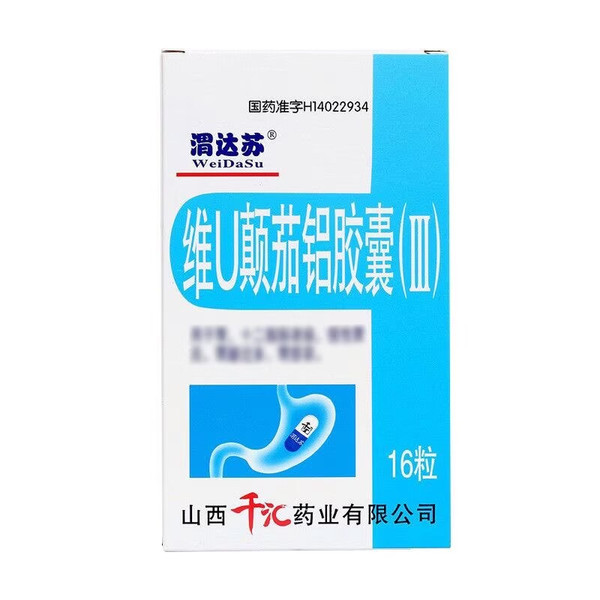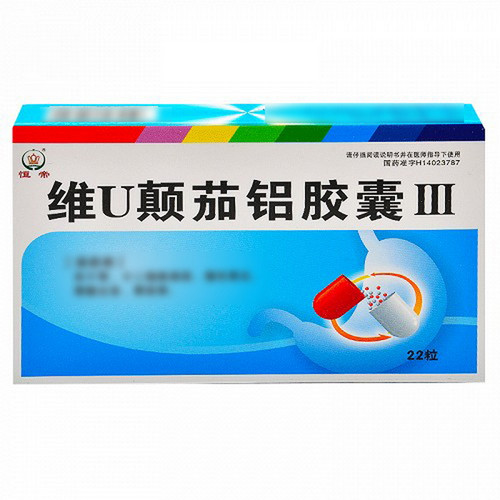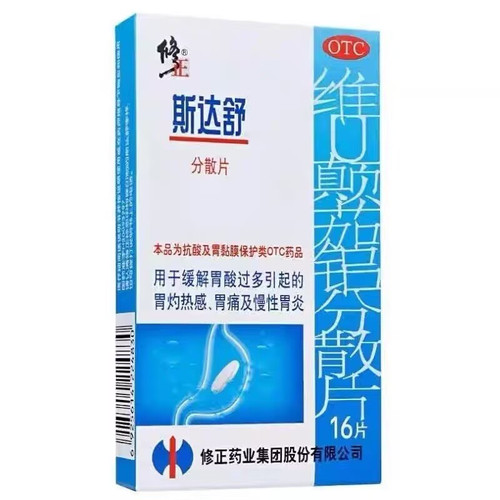Product Overview
[Drug Name]
Generic Name: Vitamin U Belladonna Aluminum Capsules (III)
Trade Name: WeiDaSu WeiUDianQieLvJiaoNang (III) 16 Tablets
Pinyin Full Code: WeiDaSu WeiUDianQieLvJiaoNang (III) 16 Tablets
[Main Ingredients]
This product is a compound preparation. Each capsule contains 140 mg of aluminum hydroxide, 50 mg of vitamin U (iodomethylmethionine), and 10 mg of belladonna extract.
[Properties]
This product is a capsule containing white or off-white powder or granules.
[Indications/Main Functions]
For gastric ulcers, duodenal ulcers, various types of chronic gastritis, hyperacidity, and gastric cramps.
[Specifications]
16 tablets
[Dosage and Administration]
Oral. Adults: 1 capsule three times a day.
[Adverse Reactions]
1. Constipation, decreased sweating, dryness of the mouth, nose, throat, and skin, blurred vision, and difficulty urinating (especially in the elderly).
2. Rare cases may include eye pain, increased intraocular pressure, allergic rash or herpes, abnormal taste, slowed breathing, and extreme fatigue and weakness. Long-term, high-dose use may cause dizziness, fainting, cardiac arrhythmia or psychiatric symptoms, and unusual fatigue and weakness (due to hypermagnesemia or other electrolyte imbalances).
[Contraindications]
1. Contraindicated in patients with appendicitis or abdominal pain.
2. Contraindicated in patients with fractures or hypophosphatemia.
3. Contraindicated in patients with allergies to this product.
[Drug Interactions]
1. Avoid taking other medications concurrently with this product, as aluminum hydroxide can bind to other medications and affect their efficacy.
2. This product can weaken the effects of metoclopramide and domperidone and should not be taken together.
3. If this product is to be used concurrently with drugs such as cimetidine and ranitidine, a minimum of one hour should be allowed between the two.
4. Taking this product concurrently with enteric-coated tablets may accelerate their dissolution and should not be used together.
5. Concomitant use with other medications may cause drug interactions. Please consult your physician or pharmacist for details.
[Precautions]
1. This product has a constipating effect and may even form fecal lumps.
2. Aluminum hydroxide can adsorb bile salts when used in large doses, thereby reducing the absorption of fat-soluble vitamins, especially vitamin A.
3. People who are intolerant to atropine or other belladonna alkaloids may also be intolerant to belladonna.
4. Patients with the following diseases should use this product with caution: (1) heart disease, especially arrhythmia, congestive heart failure, coronary heart disease, mitral valve stenosis, etc.; (2) reflux esophagitis; (3) gastrointestinal obstructive diseases; (4) glaucoma (angle-closure type or latent type); (5) acute bleeding with cardiovascular insufficiency; (6) moderate damage to liver and kidney function; (7) hypertension; (8) hyperthyroidism; (9) myasthenia gravis; (10) autonomic nervous system diseases; (11) prostatic hypertrophy, non-obstructive urinary tract diseases (low bladder tone) and obstructive urinary tract diseases; (12) ulcerative colitis.
[Pediatric Use]
This study has not been conducted and no reliable references are available.
[Elderly Use]
Used doses may cause symptoms such as irritability, tremors, lethargy, or delirium in elderly patients. They are also more susceptible to antimuscarinic side effects, such as constipation, dry mouth, and urinary retention (especially in men), as well as undiagnosed glaucoma. Elderly patients with intestinal weakness or preexisting signs of paralytic ileus are at risk of developing complete intestinal obstruction. Therefore, caution should be exercised in elderly patients.
[Overdose]
Long-term, high-dose use can cause severe constipation and intestinal obstruction caused by fecal lumps. Long-term use in the elderly can also lead to osteoporosis and, occasionally, renal silicate stones.
[Pharmacology and Toxicology]
The vitamin U in this product cleanses ulcers and promotes ulcer healing. Aluminum hydroxide neutralizes or buffers existing gastric acid, raising the pH in the stomach and thereby alleviating the symptoms of excessive gastric acid. However, its acid-neutralizing ability is lower than that of magnesium-containing preparations and calcium carbonate, but higher than that of aluminum carbonate and sodium dihydroxyaluminum carbonate. Belladonna fluid extract has anti-M cholinergic effects, inhibiting the muscarinic effects of acetylcholine. It targets cholinergic receptors located in smooth muscle, myocardium, the sinoatrial and atrioventricular nodes, and glands. Large amounts of belladonna can also reduce gastrointestinal motility and secretions, lower ureteral and bladder tension, and only slightly relax the common bile duct and gallbladder. Belladonna's antiemetic effect primarily stems from its ability to reduce stress hormones in labyrinthine receptors and inhibit conduction in the vestibular and cerebellar nerve pathways.








